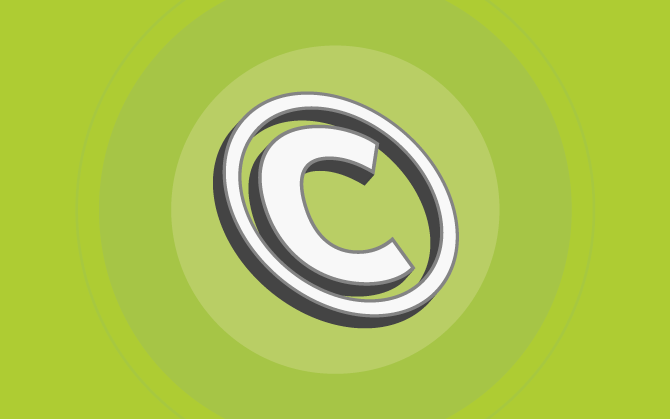
Find out what copyrights are and how they affect your work
Do you want to protect your literary or artistic work? Here is what you need to know.

What will we see in this post
Copyright is the best way to protect original content from unauthorized use by other individuals. In that sense, it is essential to safeguard your intellectual work.
Considering how the internet has changed how people consume music, movies and pretty much everything else, copyright infringement has become an even bigger issue.
Digital piracy and the unauthorized use of materials is a common problem, so keep reading to learn more about copyrights and find out how to protect your products on the internet!
What are copyrights?
Copyrights are merely the rights of authors. Through this registration, authors of works can receive the proceeds from their sale or sue those who use or copy them without authorization.
When we talk about pieces of work, it’s interesting to emphasize that included in this group are various products of the intellectual and cultural industry, among which we can mention:
- Books and poems;
- Courses;
- Songs and soundtracks;
- Films;
- Videos;
- Documentaries;
- Software;
- Images, drawing and paintings.
Copyright vs. trademark registration: What are the differences?
Lots of people confuse trademarks with copyrights. But you need to know that they aren’t the same thing!
Trademarks are represented by the symbols “™” or “®”. They are used to distinguish an organization from others and prevent copies of the logo or the names used in the marketplace.
Do you want an example? Nike, Apple and McDonald’s are trademarks. This means that other organizations cannot copy them. If this occurs, they will be committing a trademark infraction, especially because this creates confusion and induces consumers to err.
On the other hand, copyrights are used to protect art and individual intellectual and creative works. In other words, they’re not intended for the protection of corporate logos.
Let’s suppose that you’ve been hired to create a company’s logo. In this case, you won’t have any copyright over it, because this creation isn’t considered as one of your assets. Technically, it will be part of the organization’s assets and therefore, is protected by trademark law.
What are the legal aspects of copyrights?
In the age of data and information, it isn’t hard to conclude how important copyrights are for organizations concerned about protecting themselves from digital violation fraud.
Precisely for this reason, the law regulated these rules and ensured that authors have exclusive freedom to use and profit from their creations.
It should be emphasized that these rules are similar worldwide, since there are international treaties in place that aim to standardize protections and make procedures simpler and faster.
The Berne Convention is the most famous international document about the subject and has been ratified by 164 countries, including the American continent, Europe and Asia. With this, your copyright is recognized in various parts of the world.
To do so, you need to comply with a few requirements, especially the copyright notice on the product, containing the following:
- The word copyright;
- The copyright symbol: ©;
- Publication date;
- Name of the author or copyright holder.
Obviously, when the work contains a valid alert, the violator cannot claim ignorance regarding such protection, which makes the punishment easier and more effective.
How to obtain a copyright registration?
Talking about copyrights is essential for organizations and professionals that work with intellectual production, right?
Teachers, coaches, content producers, designers, photographers, authors and marketing agencies, for example, need to make sure that their efforts are lucrative. After all, unauthorized copies interfere in their earnings.
The question is: How do you obtain a copyright registration and legalize your digital business? The process is quite simple. But first of all, you need to observe if your work is eligible to receive this protection. This is because certain creations are excluded, such as:
- Ideas, normative procedures, mathematical systems, and methods;
- Schematics, mind maps or plans for businesses and games;
- Blank forms to be filled out;
- Legal texts, regulations and court decisions;
- Calendars and schedules;
- Names and titles.
Now, check out a few simple steps to register your work in the USA and guarantee your copyrights! As we told you, this process is similar worldwide, but make sure you research your country’s rules in detail.
1. Register online
First of all, you need to register in the U.S. Copyright Office and create an account. The process is pretty straightforward:
- Fill in your application
- Upload your work in digital format (or mail it)
2. Pay the fee
For the copyright registration, you need to pay a fee before you submit your application. The basic fee for online registrations goes from 35 to 55 USD. Group registration and renewals fall under a different category. You can check the current filing fees here.
3. Receive your certificate
After carefully filling in your application and submitting it, you’ll receive your certificate. Keep in mind that your claim may be rejected for a number of reasons. However, you’ll have a chance to file an appeal if you do not agree with the decision.
If everything works out alright, you’ll be the copyright owner!
Why you should worry about digital security
You have probably noticed that the procedure to have your copyrights protected isn’t complex at all. In addition, the initial investment is low when compared to the benefits it provides to your business.
Still, many entrepreneurs and content producers forget about this strategy and face constant problems with piracy, plagiarism and the improper use of another person’s work.
With the widespread access to the internet, this can become a sheer headache. Copying and selling third-party materials has become easier, which requires smart decisions by the true authors.
Seeing your product being used by other people who made no effort to produce it is terrible, isn’t it? Check out below, the benefits of digital security!
1. It reduces financial losses
The great benefit of digital protection actions is the reduced losses caused by the unauthorized sale of products.
Authors have invested time, money, knowledge and dedication in order to create their products. For this reason, they should be the only ones to decide what to do with them. When unauthorized people sell or advertise them, these authors’ earnings are jeopardized and their professional growth is damaged.
2. It adds value to your creations
Intellectual and artistic productions are unique, and therefore, they must be protected. When you obtain your copyright registration, you prove that the product is exclusive and the result of your knowledge.
With consumers increasingly more demanding, this is a major differential. The symbol provides credibility and adds value to your creations, which reflects in more sales and profits.
3. It inhibits the action of plagiarists
Finally, we need to emphasize that investing in digital security is a smart way of inhibiting the actions of plagiarists and scammers.
Because the law protects your rights, it’s easier to identify people who act in bad faith and force them to compensate you for your losses. In a way, the copyright notice is a clear demonstration that you can bring the case to justice and can prove your intellectual ownership.
All done: now it’s time to apply for your copyright!
We hope that this post has been useful. Now you know how to obtain the copyright registration of your creations, guaranteeing that you have every right to enjoy the financial benefits that are the results of your creativity and knowledge.
And if you wish to protect your business even further, make sure you read our post on what precautions to take when you receive online payments.




